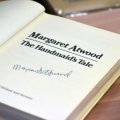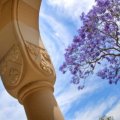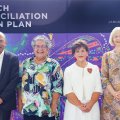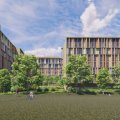For most high school students, competing at an international competition at NASA’s Kennedy Space Centre is an idea that is simply out of this world.
But for 26 students from St John’s Anglican College, it’s a reality made possible by hard work, inspiring teachers and support from The University of Queensland.
Students from years 11 and 12 were hand-picked to join peers from around the world competing in the annual Conrad Spirit of Innovation Challenge which supports ideas to build global sustainability and benefit humanity.
UQ School of Mechanical and Mining Engineering Head Professor David Mee presented the students with awards.
“It’s amazing that students this young are thinking of ideas this big,” Professor Mee said.
“These are the people who will make up the next generation of scientists, engineers and mathematicians who will change this world and, who knows, maybe others.
“Engaging young people to innovate like this is vital to stimulating an interest in STEM studies at university.”
The St John’s students, divided into six teams, are the only Australians to make the competition. They worked through their holidays and have spent almost a year preparing ideas for the challenge.
The ideas include:
- A futuristic hand brace that would provide support while soothing arthritic pain (Team Medico).
- A mobile phone app that helps prevent the rising problem of sleep or wakefulness disorders from smart devices (Team Lumos).
- A tiny device inserted under the skin that automatically distributes medical dosages for patients with Attention Deficit Hyperactivity Disorder (Team Heilsa).
- An exoskeleton spacesuit that gives astronauts extra strength and agility while working outside their craft (Team Strike Wolf).
- An automated solution to the Epipen, called the Epiband, that responds with a shot of adrenalin when the wearer shows signs of anaphylactic shock (Team Asclepius).
- Tiny nanobots, called NanoBetes, that live in a diabetic’s bloodstream and automatically monitor glucose levels and distribute insulin (Team MJNT).
Eighty other teams from around the world will travel to Florida for this year’s challenge, where they will showcase their innovative solutions to existing problems in aerospace and aviation, cyber technology and security, energy and the environment, and health and nutrition.
These bright young innovators are aiming to raise an additional $5000 to fund their trip. If you can help, visit the St John’s Conrad Challenge Go Fund Me page.
Media: Casey Fung, c.fung@uq.edu.au, 3356 7887.
.jpg)


.png?itok=xWvYRDbm)




.jpg?itok=A3VEKM1Y)

